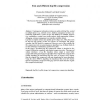Free Online Productivity Tools
i2Speak
i2Symbol
i2OCR
iTex2Img
iWeb2Print
iWeb2Shot
i2Type
iPdf2Split
iPdf2Merge
i2Bopomofo
i2Arabic
i2Style
i2Image
i2PDF
iLatex2Rtf
Sci2ools
115
click to vote
ADBIS
2007
Springer
2007
Springer
Fast and Efficient Log File Compression
Contemporary information systems are replete with log files, created in multiple places (e.g., network servers, database management systems, user monitoring applications, system services and utilities) for multiple purposes (e.g., maintenance, security issues, traffic analysis, legal requirements, software debugging, customer management, user interface usability studies). Log files in complex systems may quickly grow to huge sizes. Often, they must be kept for long periods of time. For reasons of convenience and storage economy, log files should be compressed. However, most of the available log file compression tools use general-purpose algorithms (e.g., Deflate) which do not take advantage of redundancy specific for log files. In this paper a specialized log file compression scheme is described in five variants, differing in complexity and attained compression ratios. The proposed scheme introduces a log file transform whose output is much better compressible with general-purpose algo...
Related Content
| Added | 06 Jun 2010 |
| Updated | 06 Jun 2010 |
| Type | Conference |
| Year | 2007 |
| Where | ADBIS |
| Authors | Przemyslaw Skibinski, Jakub Swacha |
Comments (0)

